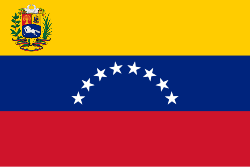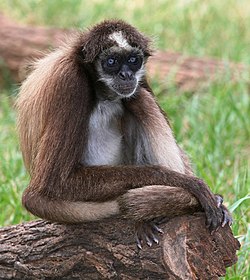
Back بوابة:فنزويلا Arabic Portal:Venezuela German Portal:Venezuela Spanish Portail:Venezuela French Portale:Venezuela Italian Portal:Venezuela Malay Portal:Venezuela Portuguese Портал:Венесуэла Russian
The Venezuela Portal Venezuela, officially the Bolivarian Republic of Venezuela, is a country on the northern coast of South America, consisting of a continental landmass and many islands and islets in the Caribbean Sea. It comprises an area of 916,445 km2 (353,841 sq mi), and its population was estimated at 29 million in 2022. The capital and largest urban agglomeration is the city of Caracas. The continental territory is bordered on the north by the Caribbean Sea and the Atlantic Ocean, on the west by Colombia, Brazil on the south, Trinidad and Tobago to the north-east and on the east by Guyana. Venezuela is a presidential republic consisting of 23 states, the Capital District and federal dependencies covering Venezuela's offshore islands. Venezuela is among the most urbanized countries in Latin America; the vast majority of Venezuelans live in the cities of the north and in the capital. The territory of Venezuela was colonized by Spain in 1522 amid resistance from Indigenous peoples. In 1811, it became one of the first Spanish-American territories to declare independence from the Spanish and to form part of the first federal Republic of Colombia (Gran Colombia). It separated as a full sovereign country in 1830. During the 19th century, Venezuela suffered political turmoil and autocracy, remaining dominated by regional military dictators until the mid-20th century. From 1958, the country had a series of democratic governments, as an exception where most of the region was ruled by military dictatorships, and the period was characterized by economic prosperity. Venezuela has experienced democratic backsliding, shifting into an authoritarian state. It ranks low in international measurements of freedom of the press and civil liberties and has high levels of perceived corruption. Venezuela is a developing country, has the world's largest known oil reserves, and has been one of the world's leading exporters of oil. Previously, the country was an underdeveloped exporter of agricultural commodities such as coffee and cocoa, but oil quickly came to dominate exports and government revenues. The excesses and poor policies of the incumbent government led to the collapse of Venezuela's entire economy. The country struggles with record hyperinflation, shortages of basic goods, unemployment, poverty, disease, high child mortality, malnutrition, environmental issues, severe crime and corruption. US sanctions and the seizure of Venezuelan assets overseas have cost the country $24–30 billion. These factors have precipitated the Venezuelan refugee crisis in which more than 7.7 million people had fled the country by June 2024. By 2017, Venezuela was declared to be in default regarding debt payments by credit rating agencies. The crisis in Venezuela has contributed to a rapidly deteriorating human rights situation. (Full article...) Selected article -Venezuela was introduced to cinema as a for-profit industry in the 1890s, when the medium became international. There were at least eight national films made in the decade, by three groups of filmmakers — one of the groups was based in Maracaibo and one was based in Caracas. The first film screening in the nation may have taken place as early as 1894, but is generally reported as 1896, with this later date being the first scheduled public screening. (Full article...) Selected picture Mount Kukenán, in the Guiana Highlands
Selected biography -Cilia Adela Flores de Maduro (born 15 October 1956) is a Venezuelan lawyer and politician. She is married to the President of Venezuela Nicolás Maduro, making her the First Lady. Since 2015, she has also been a deputy in the National Assembly of Venezuela, of which she was president from 2006 to 2011, for her home state of Cojedes. In 2017, the Constituent National Assembly was founded, in which she is a member of the Presidential Commission. (Full article...) In this month...
Did you know (auto-generated) -
Selected list -The Salón de la Fama y Museo del Béisbol Venezolano (in English, the Venezuelan Baseball Hall of Fame and Museum) is a nonprofit institution operated by private interests, which was founded on April 18, 2002, thanks to the vision of Carlos Daniel Cárdenas Lares. The institution is located at Centro Sambil, in Valencia, the capital city of Carabobo State and the third largest city of Venezuela. The museum offers visitors the origins and growth of baseball in the world and the history of what is known as the National sport of Venezuela. It also shows, through its exhibitions, the most prominent players who have made significant achievements, as well as efforts to honor people who have highlighted the activity of baseball in Venezuela, recognizing and appreciating their impact on national culture and exalt those who have made outstanding contributions to the sport. (Full article...) Current eventsNo recent news More did you know...
TopicsCategoriesRecognized content
Featured articlesGood articles
Featured pictures
New articlesThis list was generated from these rules. Questions and feedback are always welcome! The search is being run daily with the most recent ~14 days of results. Note: Some articles may not be relevant to this project.
Rules | Match log | Results page (for watching) | Last updated: 2025-04-22 23:05 (UTC) Note: The list display can now be customized by each user. See List display personalization for details.
Things you can doWikiProjects
Related portalsAssociated WikimediaThe following Wikimedia Foundation sister projects provide more on this subject:
Discover Wikipedia using portals
|





































